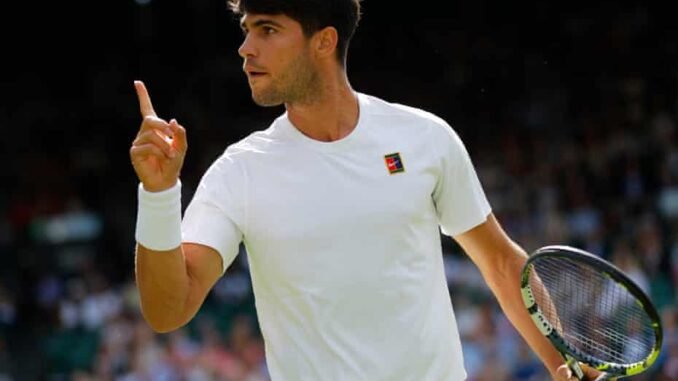
Tarvet is removed from Carlos Alcaraz’s back without hesitation or remorse.

Yes, there were drawbacks. Should we concentrate on the drawbacks? Should we linger a bit on the weaknesses? The unusual mistakes, the double-faults, the sporadic sloppiness at the nett, the regular dips in intensity? Should we be amazed that one of the best players of his generation (10) received fewer break points (11) than the tournament’s lowest-ranked player? In light of this data, should we issue a warning that the defending champion will need to improve his performance? Since he is Carlos Alcaraz and there is a whole cottage industry centred around upholding the notion that Alcaraz is constantly in crisis—a crisis this severe—of course we will.
Alcaraz is essentially a magic-eye puzzle you can read in whatever way you want, and after the sweat-drenched psychodrama of Fabio Fognini on Monday night there were more danger signs in his 6-1, 6-4, 6-4 win over Britain’s Oliver Tarvet; if you really, really wanted to see them.
The more prosaic truth is that Alcaraz was playing himself as much as he was playing the world No 733 from St Albans. Tarvet is one of those classic British folk heroes the early rounds of Wimbledon always seem to throw up, complete with shaggy-dog backstory and tabloid headline-friendly name. And if Alcaraz was expecting an easy afternoon of Tarvet practice, he quickly discovered that it would be anything but easy shaking off this particular Tarvet from his back.
Certainly Tarvet seemed to get an early read on the Alcaraz serve, used his speed and coverage to trade happily from the baseline, rode the early waves of noise from the home crowd. Some of his passes were sublime. Above all he looked untroubled, unfazed, hyper- confident, like a crypto-billionaire who had won a game against Carlos Alcaraz in a charity auction. “Good serve,” he called out at one point as his opponent pinned him with a vicious delivery to the body. Alcaraz shot him a look as if to say: yeah. Obviously it’s a good serve. I’m Carlos Alcaraz. Who are you again?
Naturally, though, Alcaraz’s serve will never be able to match the read he has on yours. The only true danger here was the confected kind, even though both men continued to swing while Tarvet made break points and saved others. In the end, it was like bringing a sword to a sword duel when your opponent has around six significantly superior weapons. Tarvet perhaps played the best match of his life. Alcaraz continued to tease him with the drop shot, generally hitting but missing occasionally, with a sick pleasure. Naturally, though, the drop shot, which is a mainstay of the Alcaraz game, may also be used against him. One point is deducted for missing it, which is equivalent to.
Leave a Reply